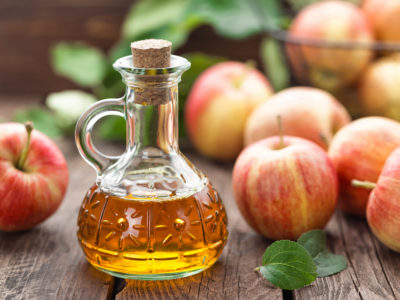Table of Contents[Hide][Show]
How to Boost Your Body’s Antibody Production+−
- Make Healthy Food Choices
- Probiotic Tea: Everything You Need to Know
- Stay Hydrated
- Lower Your Stress Levels
- Exercise Moderately
- Choose the Right Supplement
- 5 Practical Tips to Build a Healthy Immune System for Kids
- MASTER Your Immune System with Dave Asprey of Bulletproof Radio
- Apple Cider Vinegar: Immune System Boost or Bust?
Flu. Respiratory infections. Hay fever. Eczema.
What do all of these have in common?
They’re all caused by germs, invaders that attack your otherwise healthy body.
And, more importantly, they can all be eliminated by antibodies.
But what exactly are antibodies, and how can you make sure you have plenty of them?
Let’s take a look at your body’s defense system.
What Are Antibodies?
When your body is exposed to foreign substances such as bacteria, viruses, toxins, abnormal cells (such as cancer cells), and other possibly infectious organisms—collectively known as antigens—your immune system releases antibodies to protect itself.
Antibodies form a crucial part of your body’s natural “defense system.” They are proteins that travel through your body’s circulatory system, spotting and neutralizing harmful invaders.
The antibody protein forms in a Y shape. The bottom, or vertical, leg of the Y is its base, which helps it communicate with other parts of your immune system. The two arms or tips of the Y can bind to the antigens, triggering other cells to fight the invader.
How Antibodies Form
There are two main triggers for antibody production: infections and vaccines.
- Antibodies can form in response to infections. A particular type of white blood cell, known as a plasma cell, produces antibodies when you have an infection. They’re incredible workhorses! In fact, one plasma cell can secrete anywhere from hundreds to thousands of antibodies in just one second.
- Your body can also create specific antibodies as a reaction to a vaccine. Take, for example, one of the most common vaccines, the influenza (flu) vaccine. The vaccine imitates the flu, but in a weakened state that won’t endanger you or cause any major illness. When you receive your “flu shot,” your body creates the antibodies needed to fight the flu.
Autoimmune Diseases
Normally, your body recognizes antigens and produces the antibodies needed to defend against them.
However, things don’t always go according to plan.
Occasionally, your immune system fails to recognize (and thus ignore) the body’s own cells. Or, it may overreact to a safe substance, such as food. It mistakenly sees these as foreign invaders and produces antibodies that attack… itself.
When this occurs, it can cause inflammation and damage to your otherwise healthy cells, tissues, and organs, commonly known as an autoimmune disorder.
How Do Antibodies Work?
A healthy, well-functioning immune system has high levels of antibodies even when it isn’t fighting off antigens. This surplus of antibodies includes those that target specific antigens, such as pollen or the influenza virus.
B Cells and T Cells
There are two main types of white blood cells involved in this immunity-boosting process, T-lymphocytes (T cells) and B-lymphocytes (B cells).
- T cells detect when antigens have entered your body and activate the B cells. And, if that same “germ” returns, your T cells will recognize it.
- B cells develop into the plasma cells that produce antibodies to fight off infections.
How Antibodies Fight Infections
The first time your body is exposed to an infection or other foreign substance, it can take several days for your body to recognize the antigen, produce antibodies, and eliminate the antigen.
Luckily, the antibodies created in response to an antigen remain in your immune system even after that antigen has been eliminated. And, your body remembers what it learned the first time and is able to quickly recognize and fight off that foreign invader.
If that antigen should return, you have the right antibodies ready to get to work, defending your body and keeping you healthy.
The length of time that an antibody lasts in your body varies from person to person and can also vary depending on the type of antibody.
Also, keep in mind that antibodies are produced to fight a particular infection. The antibodies created to fight off chicken pox, for example, will protect you from developing a second case of chickenpox. But those same antibodies won’t be able to defend you against measles.
Different Types of Antibodies
Your most important antibodies are immunoglobulins, and they can be classified according to their immune response jobs and their locations.
There are five major classes of immunoglobulins. Let’s take a look at each of these and how they protect you from antigens.
Immunoglobulin G (IgG)
The most important immunoglobulin is IgG, the smallest antibody by size, but the most abundant in your immune system. It’s so abundant that it makes up about 80% of your immunoglobulins.
IgG is a great general-purpose antibody, fighting off viruses, bacteria, and toxins. It also creates a critical role in establishing immunity after an infection.
Additionally, IgG is incredibly important for expectant mothers. As the only antibody that can travel across the placenta, it provides natural immunity for the fetus.
IgG is found in your blood, plasma, and most tissues.
Immunoglobulin A (IgA)
IgA is the antibody for bacteria and viruses. It’s also the second most abundant antibody, making up between 10% and 15% of the total immunoglobulins.
IgA protects mucosal surfaces (mouth, nose, eyes, and lungs) from antigens by preventing microbes, including bacteria and viruses, from attaching to their epithelial cells.
Like IgG, this immunoglobulin is important for expectant mothers. IgA is found in colostrum, the first milk produced during pregnancy, and helps strengthen a newborn’s immune system.
IgA is found in body secretions such as saliva, sweat, tears, and all mucous secretions.
Immunoglobulin M (IgM)
IgM is the largest and one of the heaviest immunoglobulins, but it only makes up 10% of your antibodies.
IgM is the earliest antibody to be present in your immune system, produced by fetuses before birth. It also has more antigen binding sites than the other immunoglobulins, which makes it highly effective at activating the immune system.
Typically, IgM is present in your vascular system, your blood and blood vessels. It is your body’s main defense against blood infections. IgM deficiencies are often linked to septicemia (blood poisoning).
Immunoglobulin D (IgD)
IgD is the least understood of all the immunoglobulins.
However, studies have found elevated levels of IgD present in participants with certain inflammatory autoimmune diseases, including lupus and rheumatoid arthritis.
IgD may also play a role in the growth, maturation, activation, and maintenance of antibody-producing B cells.
IgD can be found in the tissues that line your chest and abdomen.
Related
Rheumatoid Arthritis: A Complete Guide
Learn what causes rheumatoid arthritis, how it’s diagnosed, and what you can do for relief from its symptoms.
Immunoglobulin E (IgE)
Of all the antibodies, IgE is the least abundant, with a concentration 10,000 lower than IgG.
IgE is mostly used as an antibody for pollen, animal dander, fungus, and other allergens. It can also help your body with inflammatory reactions, hypersensitivity, and helminthiasis (parasitic infections).
Found in respiratory secretions, IgE levels are significantly higher in people with allergic reactions including asthma, hay fever, and atopic dermatitis. In fact, IgE levels in response to specific allergens are often measured and used to diagnose the cause of allergies.
How to Boost Your Body’s Antibody Production
One of the best things you can do for your body is to support the production of its natural antibodies so they have enough strength to keep fighting bacteria, viruses, toxins, and more.
Here are some of the top ways you can boost your antibodies to keep your body healthy and happy.
Make Healthy Food Choices
The right foods can be huge contributors to antibody production.
Foods high in vitamin C are thought to help your body produce more white blood cells, and thus more antibody-producing B cells.
Some good choices include: broccoli, citrus foods (grapefruits, oranges, and tangerines), kale, kiwi, strawberries, and sweet red pepper.
Another good option is antioxidant-packed green tea. Green tea also contains amino acids, which helps your T cells produce germ-fighting compounds.
Garlic is also a good choice. It stimulates cells that fight disease, helps regulate your immune system, and increases the production of T cells.
And since antibodies are proteins, consuming lean protein makes them even stronger. Choose lean cuts of beef and pork, beans, soy, and seafood, all of which also contain zinc, a mineral that boosts antibody production.
Related
Probiotic Tea: Everything You Need to Know
In this post, we’ll answer all your questions about probiotic tea, including what’s in it and how it can support both the digestive system and immune health.
Stay Hydrated
Water helps your body produce lymph, the liquid that transports white blood cells throughout your body. By staying well-hydrated, you can help those cells go where they are needed the most.
Along with drinking plenty of water, you can eat foods such as cucumbers, watermelon, celery, and others with a high water content.
Lower Your Stress Levels
A stress-filled life can have negative impacts on your sleep, relationships, and even your antibodies.
Studies show that stress will reduce your body’s lymphocyte count. These are the white blood cells that activate and produce antibodies.
Adopt stress-lowering activities such as meditation, yoga, journaling, and spending time in nature.
Exercise Moderately
Exercise gets your blood flowing, so your white blood cells and antibodies will travel through your body faster.
But don’t overdo it! High intensity exercise can actually exhaust your body and reduce white blood cell production. Moderate exercise such as walking or yoga is better.
Choose the Right Supplement
Sometimes, regardless of diet and lifestyle choices, your natural antibodies aren’t quite cutting it. You may notice yourself catching every little cold that goes around or having a hard time fighting off an infection.
In this case, you can be proactive by choosing an antibody-supporting supplement, particularly one that promotes the production of IgG, the most prevalent of the immunoglobulins.
Unfortunately, most of the immunoglobulin or antibody supplements on the market contain dairy ingredients. This can cause mild inflammation, taxing your already-low levels of antibodies.
That’s why we’re such big fans of Ultimate IgG by Just Thrive. This daily supplement keeps your immune system strong and your body healthy. Plus, unlike most others on the market, it’s uniquely dairy-free, so you can take it even if you’re lactose intolerant.
Final Thoughts
As you can see, antibodies, especially immunoglobulins, are your body’s first line of defense and protection from infections… and worse.
Ideally, your body will be strong enough to produce the right antibodies to fight off any foreign substances that attack it. Even better, these antibodies will remain in your body, just in case that same germ tries to return.
To make sure your body stays healthy, make diet and lifestyle choices that promote the production of antibodies and support your immune response.
You May Also Like…






